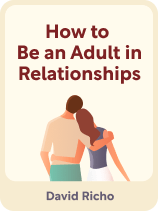

This article is an excerpt from the Shortform book guide to "How to Be an Adult in Relationships" by David Richo. Shortform has the world's best summaries and analyses of books you should be reading.
Like this article? Sign up for a free trial here.
Are elements of your childhood creeping into your relationships? Can adults be treated for childhood trauma?
People can go years without treating childhood trauma or even realizing that they’re suffering from it. For those who have accepted that it’s negatively affecting their lives, How to Be an Adult in Relationships by David Richo has three practices that will help heal those wounds.
Here’s how to treat childhood trauma in adults so they can learn to love.
How to Heal Your Childhood Wounds and Grow Emotionally
Richo says that you can learn how to treat childhood trauma in adults and reach emotional maturity by learning to mindfully love yourself. Loving yourself leads to maturity because it gives you a strong sense of self-worth and a sense of responsibility for meeting your own needs.
(Shortform note: This process—giving yourself the love your parents couldn’t—is commonly known as reparenting yourself. Reparenting yourself involves, essentially, treating yourself like a parent should treat their child: keeping them safe, loved, and equipped with the skills and support they need to thrive. As you take care of this “inner child,” you’ll heal her wounds—and will stop repeating unhealthy patterns and behaviors that stemmed from an impulse to soothe your inner child’s pain. Instead, you’ll start to make rational, adult decisions that are good for you.)Richo suggests three key self-love practices that can help you mature: recognizing your inherent lovability, setting healthy boundaries with others, and compassionately validating yourself.
Self-Love Practice #1: Recognize Your Inherent Lovability
Recall that Richo says that all living things—including you—are inherently lovable. According to Richo, it’s important to see yourself as inherently lovable because this helps you treat yourself with love. You’ll be more inclined to take good care of yourself—for example, by speaking to yourself kindly—and less inclined to accept unloving treatment from anyone, yourself included.
(Shortform note: In Radical Acceptance, Tara Brach explains that most people find it hard to access their inherent lovability because they feel ashamed and guilty about past mistakes. She recommends moving past these barriers with self-forgiveness: the practice of welcoming your own feelings, acknowledging the good parts of yourself, and moving forward with greater compassion. This process teaches you that your mistakes don’t make you a bad person—you’re still capable of goodness and love, so you’re still inherently lovable.)
Self-Love Practice #2: Set Healthy Boundaries With Others
While it was your parents’ job to keep you safe as a child, in adulthood that responsibility is yours alone. Richo says that to protect yourself from physical and emotional harm, you have to learn to set healthy boundaries. Boundaries are the expectations you have about the kinds of behavior you will and won’t tolerate from others. For example, if you’re monogamous, you might not be comfortable with your partner flirting with other people.
Before you can be ready for a relationship, you should have a general sense of what your boundaries are and feel capable of enforcing them.
(Shortform note: In Set Boundaries, Find Peace, Nedra Glover Tawwab says that setting boundaries is a three-step process: First, identify your standards for how people should treat you physically and socially. Then, clearly communicate your boundaries during uncomfortable situations. Finally, reinforce your boundaries by restating them when they’re violated and setting consequences for repeat offenses.)
Self-Love Practice #3: Compassionately Validate Yourself
Richo’s third practice for reaching emotional maturity is facing your childhood wounds with compassionate validation: Acknowledge the ways you were hurt and underloved in childhood, and lovingly address your own pain. This process shows you that your parents’ inability to love you well was not your fault—that in fact, you deserve and are capable of receiving love from those who know how to love well, including yourself. As a result, your sense of self-worth and your self-efficacy—your ability to meet your own needs and advocate for yourself—increase.
Ricoh says there are four essential steps to processing your childhood wounds with compassionate validation:
- Remember the painful things that have happened to you.
- Fully feel the complicated emotions, like sorrow and fear, that accompanied those experiences.
- Be grateful that your childhood wounds made you resilient.
- Forgive those who hurt you and extend compassion to others who are in pain.
Tips From Trauma Experts on Healing Your Childhood Wounds
Healing from your childhood wounds can be a long, complicated, and painful process, especially if your wounds are severe and extensive. To help you make the most of Richo’s advice for healing, we’ve compiled advice from trauma experts that you can apply to each step of the process:
1) You can avoid getting bogged down by difficult feelings, which can lead to depression, by giving yourself some extra TLC and accepting care from others as you heal. Psychologists recommend talking to your loved ones about your feelings, taking good care of yourself physically, and connecting with those with similar experiences by joining support groups or reading others’ stories of grief and healing.
2) You do have to remember your own pain in order to heal—but with severe trauma, it’s also necessary to have others witness and respond compassionately to your pain. If you experienced childhood trauma, you may want to seek out a therapist who can help you process your memories without getting overwhelmed.
3) If you had traumatic childhood experiences, you might be afraid of feeling your feelings. If that’s the case, grounding exercises, which help you feel safe and connected to your present reality, may help you overcome that fear.
4) Although Richo says you should be grateful that your wounds made you resilient, some psychologists argue that trauma doesn’t actually build resilience—it undermines it. Instead of attributing your resilience to trauma, try taking a more proactive approach to increasing it by working on your mental health and establishing support systems for yourself.5) Richo says you should forgive those who hurt you because forgiveness and love for your adversaries are important ideas in the Buddhist tradition, but some psychologists note that forgiveness requires working through the issue with the person who hurt you, which isn’t always possible. If you can’t forgive, that’s OK—you can still move on by processing your feelings and giving yourself time to heal.

———End of Preview———
Like what you just read? Read the rest of the world's best book summary and analysis of David Richo's "How to Be an Adult in Relationships" at Shortform.
Here's what you'll find in our full How to Be an Adult in Relationships summary:
- The secret to a long-lasting, loving relationship
- How to overcome emotional wounds that hold you back from loving
- How the Buddhist concept of mindful loving can create a better world






